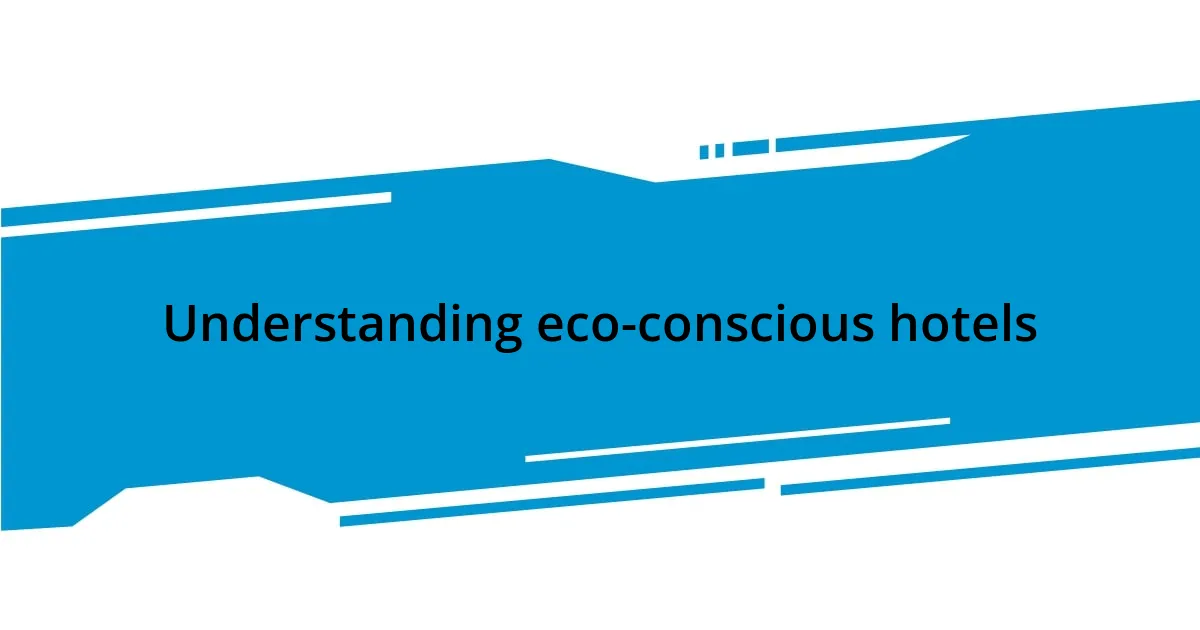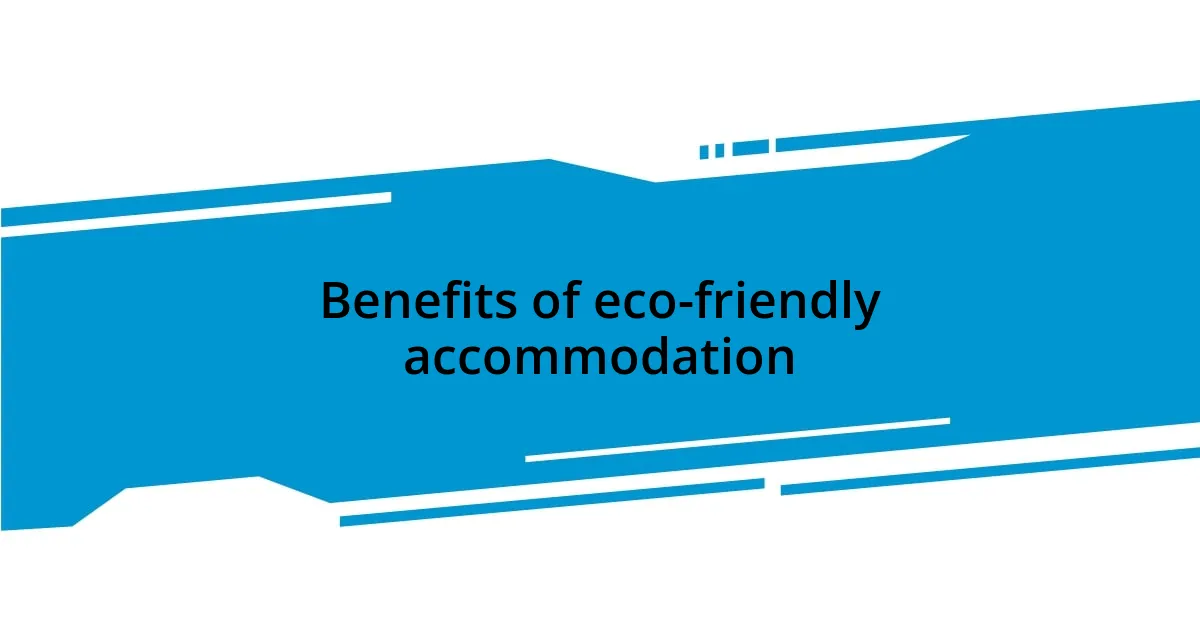Key takeaways:
- Eco-conscious hotels focus on sustainability through renewable energy, water conservation, and local sourcing, enhancing both guest experience and environmental impact.
- Key certifications like LEED, Green Key, and Rainforest Alliance serve as indicators of a hotel’s commitment to eco-friendly practices.
- Researching a hotel’s sustainability initiatives via their website, reviews, and direct communication can provide valuable insights into their environmental efforts.
- Choosing accommodations near public transport and local attractions not only reduces carbon footprints but also supports the local economy and enhances travel experiences.

Understanding eco-conscious hotels
Eco-conscious hotels are designed with sustainability in mind, focusing on minimizing their environmental impact while providing a comfortable experience for guests. I remember my first stay at an eco-resort; the moment I stepped into the lobby, I felt the warm embrace of natural materials and energy-efficient lighting. Don’t you think it’s refreshing to know that your vacation can contribute positively to the planet?
These hotels often use renewable energy sources, such as solar or wind power, and prioritize water conservation. When I stayed at one, I was pleasantly surprised to find they encouraged guests to reuse towels and provided refillable water stations instead of single-use plastic bottles. Have you ever considered how small changes like these can lead to a significant reduction in waste?
Another hallmark of eco-conscious hotels is their commitment to sourcing local and organic food. During my last adventure, I indulged in meals prepared with ingredients from nearby farms, which made each bite feel more connected to the place I was visiting. Isn’t it delightful to think that your culinary experiences while traveling can also support the local economy and reduce carbon footprints?

Benefits of eco-friendly accommodation
Staying at eco-friendly accommodations comes with a unique blend of advantages that not only enhance your travel experience but also promote sustainability. I often find myself feeling more relaxed in spaces that prioritize natural aesthetics and green practices. For instance, at a boutique eco-hotel I visited in Costa Rica, the tranquility of the surrounding jungle was complemented by their commitment to preserving the environment, creating an atmosphere that was both calming and invigorating. Isn’t it uplifting to think that the very place you’re resting your head contributes to the health of the planet?
Here are some compelling benefits of choosing eco-friendly accommodations:
- Reduced Carbon Footprint: By opting for hotels that utilize renewable energy sources, you’re actively participating in the fight against climate change.
- Community Support: Many eco-conscious hotels hire locally and source food from nearby farms, enriching the local economy.
- Enhanced Health: These hotels often avoid harsh chemicals, leading to air quality that can feel fresher and healthier during your stay.
- Unique Experiences: Staying at such hotels often means immersing yourself in local culture through sustainable practices and community involvement.
- Guilt-free Relaxation: Enjoying a vacation becomes all the more fulfilling when you know your choices are benefiting the planet and local communities.
I remember feeling a profound sense of satisfaction sipping organic coffee on the terrace of a solar-powered lodge, knowing my choices were making a difference. It’s moments like these that truly enrich your travel experience.

Key certifications to consider
When considering eco-conscious hotels, understanding key certifications can help you make informed choices. Certifications like LEED (Leadership in Energy and Environmental Design) indicate a hotel’s commitment to sustainability in areas like energy efficiency, water usage, and indoor environmental quality. I remember seeing the LEED certification prominently displayed at a hotel in New York City—this transparency made me feel instantly more secure about my impact during my stay.
Another important certification to look for is the Green Key Eco-Rating Program, which assesses hotels based on their environmental practices. During my stay at a hotel with a Green Key designation, I was pleased to find that they had implemented robust recycling programs and energy-saving initiatives. These certifications act like a seal of approval, giving you more confidence in your choices.
Lastly, the Rainforest Alliance certification focuses on sustainable tourism practices and the protection of biodiversity. I recall visiting a rainforest lodge that proudly showcased this certification; knowing that my visit supported conservation efforts added a deeper layer to my experience. As you plan your next getaway, keep these certifications in mind to ensure your accommodations align with your eco-friendly values.
| Certification | Description |
|---|---|
| LEED | Focuses on sustainable building practices and energy efficiency. |
| Green Key | Assesses environmental practices and sustainability of hotels. |
| Rainforest Alliance | Emphasizes conservation and sustainable tourism practices. |

Researching hotel sustainability practices
When I’m researching hotel sustainability practices, I always start by diving into the hotel’s website. This often provides valuable insights about their eco-friendly initiatives, like waste reduction programs or how they source their materials. I remember once stumbling upon a charming lodge in the mountains that emphasized their permaculture garden, which not only reduced their carbon footprint but also offered fresh produce for guests. How great is it to know that your meals are not just delicious but also grown sustainably?
Another effective way to gauge a hotel’s commitment to sustainability is to check online reviews. Fellow travelers often share their experiences concerning green practices and the authenticity of a hotel’s eco-friendly claims. Just a couple of years ago, I read an enthusiastic review of a waterfront hotel that detailed their efforts to protect local marine life through coral planting projects. It struck me as both inspiring and reassuring; it’s encouraging to see that guests value and notice these efforts as much as I do.
Moreover, reaching out directly to the hotel can yield more specific answers about their sustainability practices. I’ve done this before and found that staff members are usually happy to chat about their initiatives. One hotel I contacted proudly shared their use of solar panels and their partnership with local conservation groups. It made me feel more connected to the place, knowing that my stay could contribute to something bigger. Isn’t it empowering to choose accommodations that reflect your values?

Evaluating location and access
When evaluating a hotel’s location, I always think about how it impacts not only my convenience but also the environment. For instance, choosing a spot near public transportation can significantly reduce your carbon footprint. I once stayed in a boutique hotel right next to a subway station in San Francisco, and it felt great to zip around the city without relying on an Uber.
In addition to ease of access, I consider the surrounding area and its natural resources. Is there a beach, park, or hiking trail nearby? If I can explore nature without driving far, it enhances my experience and keeps me connected to the local ecosystem. Last summer, I opted for a cabin near a national park, and the sheer beauty of waking up to trees and wildlife right outside my door was breathtaking.
Lastly, I think about how the hotel’s location affects the community. Supporting local businesses can enhance my travel experience while promoting economic sustainability. During a trip to a charming seaside village, I was delighted to find a hotel that partnered with local artisans and farmers. It felt wonderful to know my stay was contributing to the community rather than just a chain hotel funneling profits away. This made me ask myself: isn’t it rewarding to choose a stay that benefits both the traveler and the destination?

Comparing pricing and amenities
When pricing eco-conscious hotels, I often discover a range of options. I remember booking a green hotel for a weekend getaway and, to my surprise, it was just as affordable as more conventional places. This experience showed me that with a little research, you can find those hidden gems that not only save you money but also align with your values.
Amenities play a pivotal role in my decision-making process. I once chose a hotel that might have cost a bit more, but the on-site composting program and organic breakfast made it worthwhile. It felt rewarding to indulge in comfort while knowing my choices were positively impacting the environment. Isn’t it nice to think that a small difference in what we pay can make a significant impact?
Additionally, I often compare the amenities offered by each hotel. For instance, I stayed at one venue that provided free bicycles for guests to explore the surrounding area, which not only added to my adventure but also encouraged a car-free experience. This made me wonder: how often do we overlook these eco-friendly perks because they may not pop up immediately in our searches? By taking the time to weigh these offerings against the cost, I ensure that my stay is as enjoyable as it is sustainable.
















